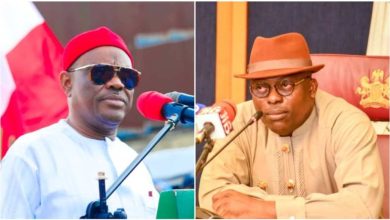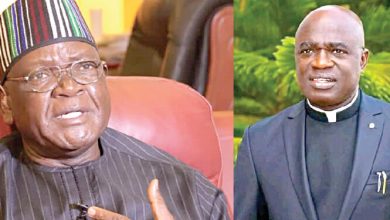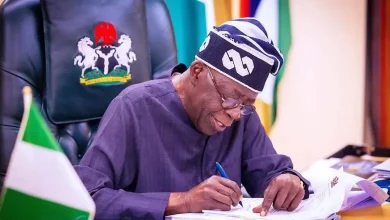‘Nnamdi Kanu Didn’t Jump Bail, He Will Prove How FG Made Him Flee Nigeria’ — Lawyer Ejimakor

Nnamdi Kanu’s lawyer, Aloy Ejimakor, has said that the leader of the Indigenous People of Biafra, IPOB, is ready to prove to the world that he did not jump bail in 2017.
The lawyer told DAILY POST exclusively that the IPOB leader will prove that the Nigerian government forced him to quit the country.
Kanu was unable to attend his trials and depart Nigeria due to a military invasion of his home and threats to his life, according to Ejimakor.
In 2017, Kanu was arrested and arraigned in court on allegations that bordered on treason.
In 2017, he was granted bail by Justice Binta Nyako of the Abuja Federal High Court.
After a military invasion of his residence in Afaraukwu, Abia State, Kanu was unable to complete his trial.
Following the military assault, the IPOB commander escaped to Europe, where he ran and coordinated his pro-Biafra activities.
He was apprehended by the Nigerian government in an African country thought to be Kenya a few weeks ago and repatriated to Nigeria to face Justice Nyako.
Justice Nyako had ordered that he be remanded in the custody of the Department of State Services (DSS) upon his return.
During this time, wild rumors circulated that Kanu had skipped bail in 2017.
Ejimakor, on the other hand, disputed the allegations of bail jumping, stating that Kanu had fled the nation due to a threat to his life.
Ejimakor said: “Despite what he has passed through, Nnamdi Kanu was in high spirits when I met with him yesterday, July 17; and he is looking forward to the first opportunity to debunk this whole story of him jumping bail. To date, he has never had such an opportunity even as he had previously requested it in the proper forum.
“In my considered view, Kanu never jumped bail, something made him to flee Nigeria and not attend his trial in October in 2017.
“That something was the military invasion of his homestead, which was subsequently brought to the attention of the court in an application that was never heard to this day.
“So, perhaps, this whole unfortunate incident would provide the first opportunity to ventilate this nagging question of jumping bail, as it will easily be shown that Kanu never made a voluntary decision not to attend his trial. Jumping bail takes some sort of voluntary act on the part of the defendant.
“Kanu’s case is purely a case of involuntary act or omission brought by the actions of the Nigerian government that had him on trial and thus held an abiding legal interest for him to remain in Nigeria to take his trial. In truth, it is the same Nigerian government that claims Kanu jumped bail and thus seeks to benefit from it that destroyed Kanu’s capacity or duty to appear at his trial.
“On the preponderance of the evidence, it would be unreasonable for anybody to conclude that Kanu jumped bail. It’s not a case of jumping bail simpliciter. Rather, it is a clear case of an adverse party forcing Kanu to flee, only to turn around and accuse him of jumping bail.
“If you get over the issue of Kanu jumping bail, then the bench warrant upon which his rendition from Kenya was grounded would, in hindsight, be seen to be wrong. It is a causal chain. Kanu was free on bond, the government invaded his home and to his credit, he successfully fled from the danger. But instead of giving him a hearing on why he fled, you declare him a fugitive and ultimately rendition him on account of that. That’s not acceptable. The government cannot profit from its own wrong.
“The rendition can’t stand because this entire thing was caused by the invasion and not by Kanu. But even if he jumped bail, extradition, not extraordinary rendition is the only legal pathway to forcing him back to Nigeria. But I can tell you that in the unique circumstances of Kanu, any extradition proceedings, either in Britain or Kenya, would have been summarily denied. That’s probably why Nigeria never bothered to apply for it. Better yet, extraordinary rendition may be a Pyrrhic victory but in the long run, it creates a helluva of legal, political and diplomatic problems for any persons or entities complicit in it.”




